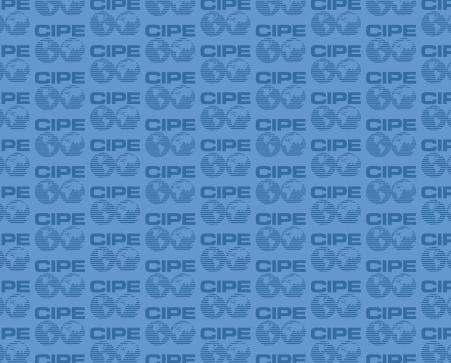
These are notes from Jean Rogers’ farewell remarks to CIPE staff as she moves on after twenty years.
As I leave CIPE, it is hard to do justice to the past twenty years; it has been quite an experience. Six positions, two trans-Atlantic transfers, and innumerable office renovations later, I can say it has moved me in more ways than one—mostly of course, in getting to know the incredible people who give life to CIPE’s mission: our amazing partners, of course; John Sullivan, who birthed the organization and still drives its focus; and the staff who are motivated to devote their own potential to increasing the potential of the world around them. So first, THANK YOU all.
Tom Donohue always jokes about our incredible hires, and it’s true; we have an enormously talented staff. I’ve been extremely pleased to work with some of the best on my own teams, whom I’ll not be able to thank as much as they deserve: Kim Bettcher for unflappable willingness to distill all we do and make it of even further use, Caroline Scullin for leading us into the 21st century world of communications, Kristen Sutara for constant stability in any maelstrom, Anna Nagrodkiewicz for her unassuming powerhouse intellect behind so many programs, and Oksana Yoon, who for me is nothing short of bedrock in every way.
I’ve had great memories with many others CIPErs, especially travelling—experiencing together everything from pastries to protests, elephants to entrepreneurs, art to advocacy, and every mode of transport imaginable from here to there.
Yet all that was just sidebar to meaningful interactions with our partners as we supported them in charting their own most effective courses for their organizations and countries. That is where CIPE excels and is exceptional in its approach.
We’ve seen terrific changes and some heartbreaking setbacks. We are sadly unlikely to be able to declare mission accomplished in the near future, but the progress is unstoppable despite the work that remains.
And speaking of areas where much work remains…
It is an oft-said truism that no country or organization can achieve its potential when half of its population is held back—when women’s voices are not heard in legislatures, in policymaking, in community leadership, in the board room, on the trading floor, at the bank, in product development, in education, at the office…the list goes on. I wonder sometimes how deeply that simple truism is understood, though, when the list is so extensive, the progress is so incremental, and the biases so deeply ingrained that they are often not even seen for what they are, notably lagging in practice even where the principles are espoused in theory.
Anyone who has worked with me on women’s programs has heard me talk about why I dislike the term “empowerment.” Too often, it is a phrase wielded as something done to women or for women. Real power—sustainable power—is not granted, it is taken.
For example, despite their enormous disadvantages, women’s growth in income globally over the next five years is projected to exceed the growth of China and India combined. That’s power. That’s power that should be taken and used. It’s power that smart people should give more attention.
It is power that can reshape the world if it is aimed at further dismantling the disadvantages and barriers women face.
So focus on dismantling them is what I intend to do, working through several avenues that each focus on the power of women. At the board level, I will be working on women’s policy issues and campaigns to elect more women here in the U.S. I will also be working with corporations on supply chain issues to create value through women-owned businesses and to harness over $700 billion in buying power to support women.
For me, it will be both fun and important. It’s also deeply connected to CIPE’s own mission and to the goals of many in its ranks. For those who share the desire to see women recognized for the value they bring to efforts large and small, I encourage you to find your power center and your voice and to use them. Use them individually, use them collectively, use them insistently, and use them unapologetically. Most of all, use them where they will be heard and create impact.
Here’s to a bright future for all. I’ll look forward to continuing to work with you as we pursue it each in our own way.
Published Date: September 03, 2013
